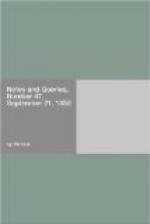“Fourthly, that the woman was made of a rib out of the side of Adam; not made out of his head to top him, nor out of his feet to be trampled upon by him; but out of his side to be equal with him, under his arm to be protected, and near his heart to be beloved.”
IOTA.
Beau Brummel’s Ancestry.—Mr. Jesse some years back did ample justice to the history of a “London celebrity,” George Brummell; but, from what he there stated, the following “Note” will, I feel assured, be a novelty to him. At the time that Brummell was considered in everything the arbiter elegantiarum, the writer of this has frequently heard Lady Monson (the widow of the second lord, and an old lady who, living to the age of ninety-seven, had a wonderful fund of interesting recollections) say, that this ruler of fashion was the descendant of a very excellent servant in the family. Not long ago, some old papers of the family being turned over, proofs corroborative of this came to light. William Brummell, from the year 1734 to 1764, was the faithful and confidential servant of Charles Monson, brother of the first lord: the period would identify him with the grandfather of the Beau; the only doubt was, that as Mr. Jesse has ascertained that William Brummell, the grandfather, was, in the interval above given, married, had a son William, and owned a house in Bury Street, how far these facts were compatible with his remaining as a servant living with Charles Monson, both in town and country. Now, in 1757, Professor Henry Monson of Cambridge being dangerously ill, his brother Charles sent William Brummell down, as a trustworthy person, to attend to him; and in a letter from Brummell to his master, he, with many other requisitions, wishes that there may be sent down to him a certain glass vessel, very useful for invalids to drink out of, and which, if not in Spring Gardens, “may be found in Bury Street. It was used when Billy was ill.” From the familiarity of the word “Billy,” he must be speaking of his son. These facts are certainly corroborative of the old dowager’s statement.
M(2).
* * * * *
QUERIES.
GRAY’S ELEGY AND DODSLEY POEMS.
I have here, in the country, few editions of Gray’s works by me, and those not the best; for instance, I have neither of those by the Rev. J. Mitford (excepting his Aldine edition, in one small volume), which, perhaps, would render my present Query needless. It relates to a line, or rather a word in the Elegy, which is of some importance. In the second stanza, as the poem is usually divided (though Mason does not give it in stanzas, because it was not so originally written), occurs,
“Save where the beetle wheels his droning flight.”
And thus the line stands in all the copies (five) I am able at this moment to consult. But referring to Dodsley’s Collection of Poems, vol. iv., where it comes first, the epithet applied to “flight” is not “droning,” but drony—




